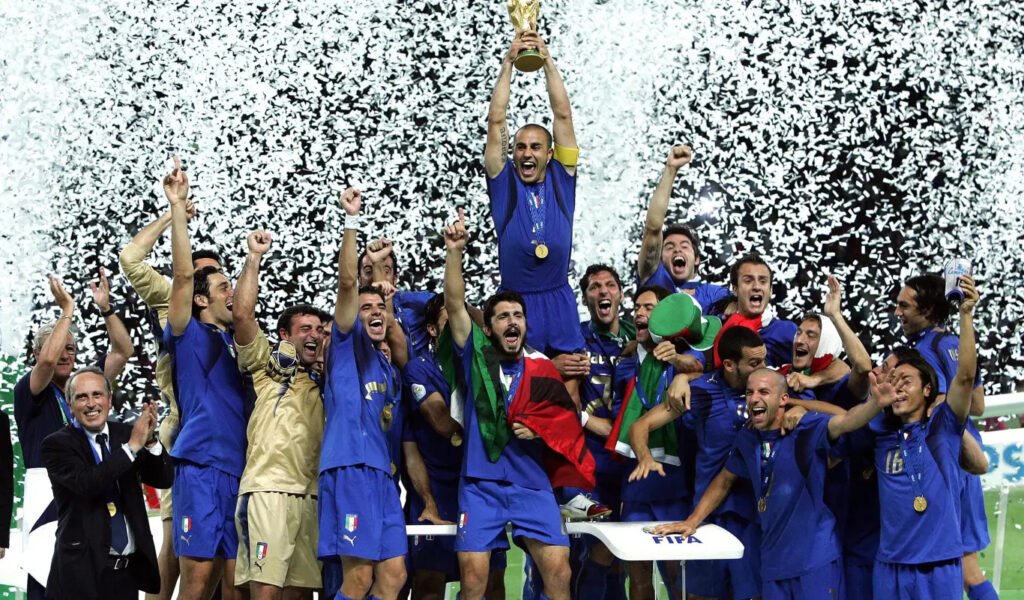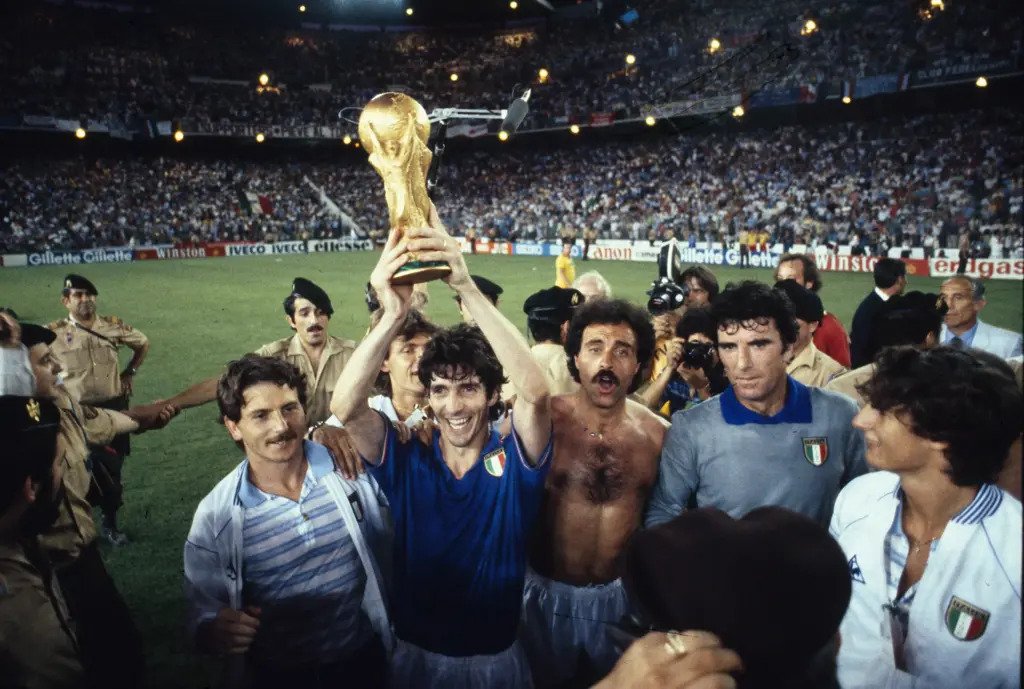Italy at The FIFA World Cups: The Italy national football team has been a dominant force in international men’s football since their debut in 1910.
Italy has won four FIFA World Cups (1934, 1938, 1982, 2006), making them one of the most successful football teams in the world. They have also advanced to the World Cup final twice (1970 and 1994), placing third in 1990 and fourth in 1978, respectively.

The Italian football team is famously called gli Azzurri (The Blues), a nod to the Savoy blue color, which represents the royal House of Savoy that once ruled over Italy. For many years, Italian sports teams have been decorated with this emblematic color.
In 1938, Italy became the first country to win the World Cup again, and they did so for an extraordinary 12 years because of World War II. In addition to its early World Cup triumphs, Italy won two Central European International Cups (1927–1930, 1933–1935) and the gold medal in Olympic football in 1936.
However, the 1950s saw a deterioration, including a failure to qualify for the 1958 World Cup, following the horrific 1949 plane disaster that took the lives of numerous members of the national squad. Italy broke a world record for the longest unbeaten streak in international football, lasting 37 games without a loss from October 2018 to October 2021, even though this would only occur again in 2018 and 2022.
1. 1934 FIFA World Cup Final: Italy vs Czechoslovakia
Italy and Czechoslovakia faced off in the second edition of the renowned football competition, the 1934 FIFA World Cup final. The 1934 FIFA World Cup winners were decided in the match, which took place on June 10, 1934, at the Stadio Nazionale PNF in Rome, Italy.
Despite hot weather with temperatures above 40°C (104°F), Italy came back from a deficit to win their first World Cup title in spectacular manner, winning 2–1.
Match Analysis
In the final, Antonín Puč gave Czechoslovakia the lead with a goal 19 minutes from the end. But Italy reacted swiftly, and ten minutes later, striker Raimundo Orsi equalized. Since there were no further goals in regulation time, the game went into extra time, which is the first time a World Cup final has lasted more than ninety minutes.
Angelo Schiavio of Italy scored the game-winning goal five minutes into extra time, giving Italy a 2-1 advantage. The Italian squad persevered to win the FIFA World Cup for the first time.
2. 1938 FIFA World Cup Final: Italy vs Hungary
Italy defended their championship against Hungary in the 1938 FIFA World Cup final, the third iteration of football’s most prestigious competition. Italy became the first team to win the World Cup on foreign soil with a 4–2 triumph at the Stade Olympique de Colombes in Paris on June 19, 1938. This World Cup would be the final one before World War II broke out.
Match Analysis
The final got off to a fast start, when Gino Colaussi of Italy opened the scoring after just six minutes. But two minutes later, Pal Titkos of Hungary swiftly equalized. Silvio Piola scored shortly after to give Italy the lead again, making it 2-1. Prior to halftime, Colaussi scored another goal, putting Italy ahead 3-1.
Gyorgy Sarosi, the captain of Hungary, scored a goal in the second half to cut the deficit to 3–2, but Piola of Italy scored his second goal in the 82nd minute to give the Azzurri a 4–2 triumph.
3. 1982 FIFA World Cup Final: Italy vs West Germany – Italy Claims Third Title
The famous Santiago Bernabeu Stadium in Madrid, Spain hosted the historic 1982 FIFA World Cup final on July 11, 1982. Italy and West Germany faced off in this exciting match, which was a landmark in World Cup history.
Match Analysis
Antonio Cabrini’s missed penalty kick highlighted the tense first half of the final, which ended goalless. Italy took the lead in the second half, starting with Paolo Rossi’s header after Claudio Gentile’s bouncing cross. Alessandro Altobelli completed a quick counterattack to increase Italy’s advantage to 3-0 after Marco Tardelli followed with a spectacular low strike from the area’s edge.
Italian President Sandro Pertini showed confidence in his country’s victory with a lighthearted gesture as it seemed certain they would win. Italy won the World Cup for the third time after a 44-year wait, defeating West Germany 3-1 despite a goal by Paul Breitner in the 83rd minute.

4. 2006 FIFA World Cup Final: Italy Triumphs Over France in Berlin
The 18th edition of FIFA’s renowned event culminated in the 2006 FIFA World Cup final, which was held on July 9, 2006, at Berlin, Germany’s famous Olympiastadion. Italy and France faced off in an exciting match, which attracted the interest of football fans all around the world. The competition featured some of the top international football players, with 32 teams competing, including Germany, the host country.
Match Analysis
After a 1-1 draw, the final ended in a penalty shootout, which was a thrilling event. In the seventh minute, Zinedine Zidane gave France the lead with a spectacular penalty kick from Panenka that struck the crossbar and went over the line. Italy reacted quickly, as Marco Materazzi headed in from a corner by Andrea Pirlo in the 19th minute to tie the score.
As the game went on, Zidane’s stellar career took a controversial turn when, following a brief altercation with Materazzi, he was sent out in extra time for headbutting Materazzi in the chest. Within the football community, this episode generated a great deal of analysis and discussion.
After extra time, the score was tied at one, despite Zidane‘s exit, forcing a penalty shootout. When Fabio Grosso scored the game-winning penalty and Italy won 5–3, David Trezeguet missed his attempt and struck the crossbar, solidifying Italy’s victory.





